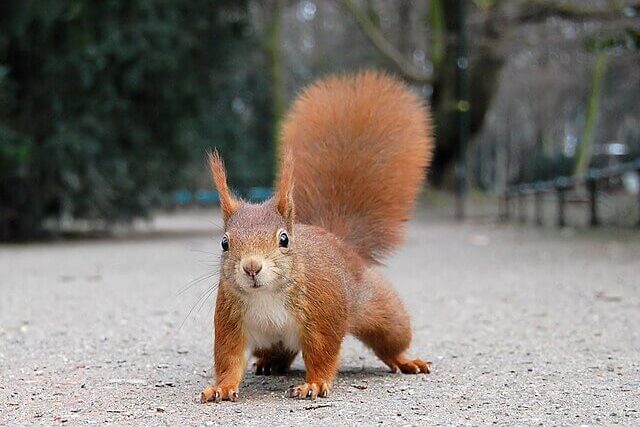
For the first time, the squirrelpox virus, a deadly disease affecting Britain’s native red squirrels, has been confirmed north of Scotland’s central belt.
Scientists diagnosed a red squirrel from Dunfermline in Fife, marking the first occurrence of the disease in this northern region, which previously had no reported cases.
Experts said it was a “worrying development” and a “major threat” to Scotland’s northerly red squirrels.
The initial outbreak of squirrelpox in Scotland was recorded in 2007 near Lockerbie, and since then, the virus has affected various red squirrel groups in the southern parts of the country.
Squirrelpox is carried by grey squirrels, who remain unaffected by the virus themselves but can transmit it to red squirrels, for whom the virus is usually lethal. Introduced to the UK from North America by the Victorians, grey squirrels have largely displaced the native red squirrels throughout most of England and Wales.
Currently, over 75% of the UK’s remaining red squirrel population resides in Scotland, making the spread of this virus particularly alarming.
The infected red squirrel was discovered by a walker in March, showing visible signs of the disease, including ulcers and scabs around its eyes and mouth, in a woodland area north of Dunfermline.
The University of Edinburgh’s Royal (Dick) School of Veterinary Studies later confirmed the presence of squirrelpox following a post-mortem examination.
The Scottish Wildlife Trust has expressed serious concerns about the potential impact on the local red squirrel population.
Liam Wilson, of the Royal (Dick) School of Veterinary Studies in Edinburgh, said: “This is a worrying development for red squirrels in Scotland, as this case north of the central belt may be the prelude to squirrelpox expansion both locally and further northward, although more investigative work is required to fully assess this risk.
“This case also highlights the key role members of the public have in wildlife conservation, as this case was detected from the submission of a dead red squirrel by a member of the public.
“If any members of the public come across further dead red squirrels in and around Dunfermline, these can be posted to us for examination using detailed guidelines.”
Symptoms of squirrelpox, such as ulcers, scabs, and weeping lesions on the face, paws, and genitalia, severely hinder the squirrel’s ability to eat, drink, or move, usually leading to death within two weeks. An outbreak can drastically reduce local populations, posing a significant risk to the survival of this cherished native species.
Nicole Still, the Scottish Wildlife Trust’s saving Scotland’s red squirrels programme manager, said: “We are extremely concerned about this latest news.
“We are asking the local community in Dunfermline to take immediate action and protect red squirrels by taking in all garden and woodland wildlife feeders for the next month, as these can contribute to the spread of the disease from greys to reds and between reds once infected.
“We are also asking for everybody to keep a close eye out for, and take photos of, any sick-looking red squirrels and email these into us, as well as report all sightings of both species to our website to inform local efforts.”
——————————————————————————
At Natural World Fund, we are passionate about stopping the decline in our wildlife.
The decline in our wildlife is shocking and frightening. Without much more support, many of the animals we know and love will continue in their decline towards extinction.
When you help to restore a patch of degraded land through rewilding to forests, meadows, or wetlands, you have a massive impact on the biodiversity at a local level. You give animals a home and food that they otherwise would not have had, and it has a positive snowball effect on the food chain.
We are convinced that this is much better for the UK than growing lots of fast-growing coniferous trees, solely to remove carbon, that don’t actually help our animals to thrive.
This is why we stand for restoring nature in the UK through responsible rewilding. For us, it is the right thing to do. Let’s do what’s right for nature!
Donate today at https://naturalworldfund.com/ and join in the solution!

